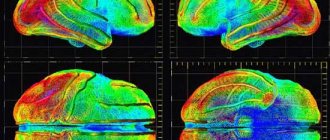Dementia is an insidious disease that develops against the background of brain atrophy and leads to a gradual change in the personality core. The disease, with the exception of rare cases, is incurable, but its development can be slowed down and its course alleviated if timely medical help is sought and treatment is prescribed correctly.
However, this is rarely possible - the reason lies in the paucity of the first symptoms, and in senile dementia they are similar to the natural processes of aging. The second important reason is the lack of knowledge that would allow one to identify the signs of the onset of dementia and consult a doctor in time for treatment.
Who is at risk for dementia
Experts recommend that those who are at risk or live with relatives belonging to it be required to study the symptoms and signs of dementia. Most often these are people:
- Over the age of 60-65 years;
- After a traumatic brain injury;
- With cardiovascular diseases (hypertension, heart attack, stroke);
- Obese;
- With endocrine pathology.
Also at risk are those who lead a sedentary lifestyle, avoid mental and physical stress, have bad habits or uncontrollably take psychotropic substances. Close relatives of those who suffered from this disease should pay attention to the possibility of developing dementia, since scientists have proven a hereditary factor.
Is prevention possible?
Of course, no one wants to face such a problem at a young age. In this regard, issues of prevention come to the fore.
There are 12 risk factors for dementia, for which there are different prevention options, notes Helen Mkhitaryan. We are talking about the following risk factors:
1. Physical inactivity. Physical activity of at least 30 minutes a day is a proven method of preventing dementia. Even regular walking will do.
2. Low level of education . Constantly train your brain and develop your cognitive reserve. Learn foreign languages, master new skills, read more.
3. Smoking. It is believed that 14% of all cases of Alzheimer's disease are potentially related to smoking. Stop smoking!
4. Alcohol abuse. Alcohol consumption is considered safe at a dose of no more than 21 units per week. But even this amount is harmful to the brain.
5. Arterial hypertension. The disease can provoke vascular dementia and Alzheimer's disease. It is necessary to keep blood pressure under control and avoid sudden jumps.
6. Obesity. We are not talking about overweight, but about obesity, when the body mass index is above 30. Monitor your diet and weight.
7. Depression. This condition can cause pseudodementia. If you feel that you cannot cope with depression on your own, be sure to consult a specialist.
8. Social isolation . There has been a surge in cognitive impairment during the pandemic, but this is more affecting older people. Social contacts create a favorable emotional background and cognitive load for the brain.
9. Hearing loss . Hearing loss deprives the brain of a lot of information and makes social interaction difficult. At any age, it is necessary to correct this sensory deficit.
10. Diabetes mellitus. It is a universal risk factor for dementia. Monitor your blood sugar levels and do not let the disease take its course.
11. Traumatic brain injuries. The more such injuries, the higher the risk. Try to avoid potentially dangerous situations.
12. Air pollution. Take care of nature and spend more time in the fresh air.
Sunset syndrome: how does it manifest in patients with dementia? More details
First signs of illness
Dementia can occur in different ways, depending on the cause of its occurrence, the location of the pathological process, and the stage of severity. The main signs of dementia appear already at the first stage, but in almost 90% of cases they go unnoticed by others. At the onset of the disease, the patient himself notices a number of changes, but does not attach due importance to them, considering them signs of fatigue, depression, or natural causes associated with the aging process. Subsequently, due to changes in mental activity and perception, the patient ceases to recognize and recognize his illness.
Regardless of the type of dementia, in general, the following symptoms and signs of dementia can be identified:
- Memory problems. They begin with ordinary forgetfulness, the inability to remember minor information: the name of a new acquaintance, the location of the keys, a recent conversation. Further, professional memory suffers, gradually the first symptoms and signs of senile dementia are aggravated by memory failures, while the person tries to reconstruct the course of events, remember what happened, filling in the gaps with fictitious stories and facts. This point distinguishes dementia from ordinary forgetfulness. In a severe stage of the disease, memory is completely lost, a person does not recognize relatives (children, parents), and sometimes - his own reflection in the mirror.
- Impaired thinking and concentration are also signs of incipient dementia. The patient's thoughts are disordered, it is difficult to concentrate on one thing, thinking is slow, clouded, the logic of judgment gradually disappears. In the later stages of the disease, a person thinks fragmentarily, false ideas arise (phobias, persecution mania, poisoning, etc.).
- Speech disorders. Just like thinking, the patient’s speech suffers: in the early stages it is characterized by many errors, and sometimes the logical chain of the story is lost due to forgetfulness. At a later stage, speech is incoherent, even to the point of producing meaningless sounds.
- Emotional disorders. They begin at the first stage and are characterized by frequent mood swings, tearfulness, moodiness, apathy, and asociality, which is why the disease is sometimes confused with depression. At later stages, panic, unreasonable anxiety, and aggression appear.
- Sleep disorders. This symptom is characterized by a gradual loss of biorhythms (daytime sleep, night wakefulness).
- Loss of sense of time and place. The patient forgets the day of the week, the year, cannot distinguish the time of day, and gets lost in a previously familiar area.
As already mentioned, signs of dementia in old people depend on the type of disease and the location of the pathological process. Thus, with dementia of the Alzheimer's type, memory suffers the most, false memories appear, speech disorders occur, and the ability to orientate in space is lost.
Vascular dementia, which accounts for 10-20% of all cases of the disease, occurs due to brain atrophy due to impaired blood supply. Signs of vascular dementia: a sharp decrease in mental activity, intelligence, fatigue, emotional disorders, impaired thinking and speech. Memory problems may not occur.
Also, the clinical manifestations of vascular dementia depend on the location of the lesion in the brain (hippocampus - impaired attention, memory; striatum - motor dysfunction; thalamus - meaningless speech).
Important! In 10% of cases, dementia is aggravated by various psychoses.
Differences between signs of dementia and other diseases
Dementia in old age is often mistaken for the processes of withering that occur in the body after 70-80 years. In this case, the combination of symptoms and their progression should alert relatives who observe suspicious symptoms.
The difference between dementia and natural decline of the body
| Defeats | Senile dementia | Natural processes |
| Memory | First of all, the loss of short-term memory, while events of the distant past are remembered in detail. Also important signs and manifestations of dementia are fantasies and fictions that replace new memories. Another difference is the loss of professional skills | Loss of up to 20% of short-term memory, combined with forgetting past events. At the same time, acquired skills are not lost. |
| Emotions | Unreasonable changes in character that progress | Depression, apathy, irritability, and tearfulness may occur. However, such manifestations are not constant and have reasons (loneliness, resentment, etc.) |
| Intelligence | Gradual decline. The main distinguishing symptom is the inability to perceive, remember new information, and acquire new skills. | Decrease, against the backdrop of maintaining previously acquired skills. But the readiness and ability to learn and remember new information remains |
Since dementia sometimes occurs in young people and children, the disease is mistakenly associated with mental retardation. To distinguish between these diagnoses, it is worth highlighting the main signs of mental retardation and dementia. The first disease is congenital and manifests itself at the age of 2-3 years. Children born with mental retardation lag behind their peers in mental and physical development. Dementia at this age most often occurs as a result of injuries, children are physically healthy, in addition to decreased mental activity, other characteristic symptoms appear, and the disease progresses.
The first signs of dementia in women
Women are much more likely to suffer from dementia than men. This is because about 50-60% of all cases of dementia are associated with Alzheimer's disease, which mainly affects women. In addition, the long life expectancy of female representatives also affects (the disease in most cases occurs after 60-70 years).
At the same time, the symptoms and first signs of senile dementia are easier to identify in women than in men. This is explained by the presence of a greater number of symptoms: patients are much more likely to experience emotional disorders, memory loss with the replacement of information with false memories.
The patient's mood can change very often and dramatically. The most typical manifestations are aggression, irritability, capriciousness, vulnerability, tearfulness, and greed. Closedness is noted, the woman stops communicating with friends and sometimes even relatives. There is no improvement in the emotional background; without treatment, the disease constantly progresses.
Signs of dementia in men
Most often, the first signs of dementia in men are disturbances in speech, thinking, and memory. Due to the localization of the lesion, nonspecific symptoms may develop: tremor, disturbances in purposeful movements. Emotional lability (frequent mood swings) is detected much less frequently than in women. Relatives may suspect the presence of the disease by an increasing decline in cognitive functions, and sometimes by unreasonable aggression or jealousy.
According to studies conducted in the USA, although the disease begins earlier in men (from 60 years of age), the first symptoms and signs of dementia appear later in men than in women. For this reason, the disease can rarely be detected at an early stage, and in some cases it remains undetected until the last stage.
Signs of the disease in young people
At a young age, dementia manifests itself in the same way as at an old age, but its prognosis is slightly more favorable. This is explained by the fact that young people more often seek help from specialists when the first signs of illness appear, as well as in connection with other causes of dementia. For example, in case of injuries, brain tumors, lack of vital vitamins and minerals, or hormonal imbalances, the progression of the disease can be completely stopped.
Symptoms and signs of dementia in young people are increasing forgetfulness, problems with thinking and speaking, concentrating, and the inability to focus and do normal work. All this leads to depression, loss of interest in life, withdrawal from society, and aggression.
Reference! Dementia in young people is registered relatively rarely; in different countries this figure reaches 1-10% of the total number of cases.
Signs of dementia in Alzheimer's disease
More than 35 million people worldwide suffer from Alzheimer's disease or other forms of dementia in old age. The incidence is estimated to double every 20 years.
The main symptom of an organic disorder is memory loss. First of all, the cells of a person’s short-term memory center die off; he cannot remember what he has been doing lately, who he was talking to, etc.
Other consequences of the disease include impairment of rational thinking (correct judgment and assessment of the situation) and spatio-temporal perception - the patient may suddenly wander in places that he previously knew closely, or lose the sense of time (a sense of a timeless state), location.
Frequent changes in emotional level and mood are also typical for the disease - alternating euphoria, depression, apathy. A person suffering from Alzheimer's disease may lose inhibitions and therefore break social conventions (inappropriate behavior, selfishness, anger). Often these people lie for no reason.
Due to the destruction of centers and connections in the brain, the disease can affect the ability to move properly and coordinate actions, so patients may have problems maintaining balance, walking, and some routine tasks become very difficult for them.
Dementia is a serious problem today - living standards are rising, average age is increasing, resulting in an increasing number of patients. The big problem is that doctors and specialists cannot cure dementia - in some clinical stages of the disease (mild to moderate severity), the symptoms and rate of progression of the disorder may only slow down, but there is no cure.
Memory loss affecting the ability to perform normal tasks
It is normal to occasionally forget work assignments, co-worker names, or phone numbers in “waves” (with subsequent recall). But people with Alzheimer's disease are more likely to forget, not remembering later. Diagnosis of dementia begins with memory testing.
Problems performing routine activities
Very busy people often get distracted, so sometimes they forget about the milk boiling in a saucepan on the stove. But the amnesia of people with Alzheimer's disease is of a different nature - they prepare food and not only forget to put it on the table, but also do not remember that they made it.
Problems with expression
While a healthy person rarely has problems finding the right word, a patient with Alzheimer's disease forgets simple words or replaces them with incorrect words, as a result of which his speech does not make sense.
Temporary and local disorientation
Everyone sometimes forgets what day it is. This is fine. But people with Alzheimer's disease get lost on familiar streets, don't know where they are, how they got there, or how to find their way home. Travel and air travel become impossible for such people.
Poor or deteriorating rational judgment
Sometimes people get so involved in an activity that they momentarily forget about the child they are looking after. Patients with Alzheimer's completely forget that the child exists. They may even dress inappropriately, such as wearing multiple items in the same category (eg shirts or blouses).
Problems with abstract thinking
Calculating utility bills can take a long time if they are more complex than usual. The problem comes when a person completely forgets what the numbers mean and what to do with them.
Putting things in the wrong places
Do you sometimes put your wallet or keys in an unusual place? Not scary. A person with dementia puts things in completely meaningless places: an iron in the refrigerator or a watch in the sugar bowl.
Changes in mood or behavior
A bad mood is an eternal companion of modern people. A patient with Alzheimer's is subject to sudden mood swings. Suddenly and unexpectedly he bursts out, cries, succumbs to anger for no apparent reason.
Personality changes
A person's personality usually changes to some extent as they age. But a patient with dementia can change fundamentally. Sometimes he becomes very confused, suspicious, or fearful (signs similar to those of PTSD).
Losing initiative
Reluctance to do housework or social responsibilities. Does this description sound like you? Do not worry. Usually activity at work returns soon. But with dementia, a person can become completely passive and need constant incentives to take initiative.
Signs of the disease in the second and third stages
In addition to the symptoms described above, in the second and third stages of the disease, household skills gradually disappear. A sick person cannot prepare food, forgets to close the refrigerator, and leaves the house leaving the door open. The skill and desire to take care of oneself is lost: washing, changing clothes.
In case of damage to the diencephalon and midbrain, hallucinations, confusion, and loss of the sense of time may appear.
Also, signs of the last stage of dementia may include various motor disorders: inability to maintain balance, tremors of the limbs, loss of praxis (the ability to perform purposeful motor acts). Three stages of dementia and the main distinguishing features
| First stage | Second stage | Third stage |
| Loss of professional skills | Loss of simple skills, inability to use most household appliances, neglect of personal hygiene | Loss of all skills, inability to repeat simple actions, sometimes even move and eat |
| Minor emotional changes (these signs of dementia are especially common in older women) | Emotional changes: apathy, depression | Complete destruction of the personal core |
| Forgetfulness is noted | Short-term memory suffers | Loss of memory, disorientation in space, time and even self-identity |
Such serious disorders as complete loss of personality, the inability to remember one’s own name, face, orient oneself in space and time, as well as the loss of the ability to independently take food and water can be interpreted as signs of death with dementia, which will soon occur.
Important! Starting from the moderate stage of dementia, the patient may refuse to eat or, conversely, eat more than necessary. This is due to the loss of short-term memory and the inability to correctly sense hunger or satiety.
Signs of dementia
There are ten typical signs of dementia.
The first and earliest sign of the development of dementia is considered to be changes in memory, and above all, short-term memory. The initial transformations are almost invisible. For example, a patient may remember events from his past youth, but not remember the foods he ate for breakfast.
The next early sign of developing dementia is speech disorders. It is difficult for patients to find the right words; it is difficult for them to explain basic things. They may try in vain to find the right words. A conversation with a sick person suffering from the early stages of dementia becomes difficult and takes more time than it previously did.
The third sign can be considered changes in mood. For example, depressive moods are constant companions of early dementia.
Apathy and lethargy can be considered the fourth sign of the pathology in question. A person suffering from dementia loses interest in previously enjoyed activities or their own hobbies.
The fifth sign is the appearance of difficulties in performing ordinary tasks. For example, a person is unable to check his credit card balance.
Often in the early stages of dementia, a person feels confused. Due to a decrease in memory function, mental activity and judgment, confusion arises, which is the sixth sign of the described disorder. The patient forgets faces, adequate interaction with society is disrupted.
The seventh sign is difficulty remembering plot lines, difficulty reproducing a television program or conversation.
Spatial disorientation is considered the eighth sign of dementia. Sense of direction and spatial orientation are common mental functions that are among the first to be impaired in dementia. The patient ceases to recognize familiar landmarks or is unable to remember previously constantly used directions. Moreover, it becomes quite difficult for them to follow step-by-step instructions.
Repetition is a common sign of dementia. People with dementia may repeat daily tasks or obsessively collect unwanted items. They often repeat questions that have already been answered before.
The last sign can be considered disadaptation to change. People suffering from the described illness are characterized by a fear of change. Because they forget familiar faces, are unable to follow the speaker’s thoughts, forget why they came to the store, they strive for a routine existence and are afraid to try new things.
Symptoms that a doctor can identify
If a patient exhibits signs that may indicate the development of dementia, it is very important not to delay contacting a specialist. The doctor will accurately determine the first symptoms of the disease, using, in addition to interviewing the patient and his relatives, a number of diagnostic tests in order to confirm or refute the disappointing diagnosis.
At the appointment, questions must be asked that help identify the initial signs of dementia in women or men:
- when the first manifestations were noticed;
- what signs were identified by relatives;
- how the patient navigates in space and time;
- is there a loss of short-term memories (three blocks of memory are tested, but the loss of short-term memory is of greatest importance);
- Are there any changes in speech and its perception?
A person can also take intelligence tests to test their ability to perform specified actions (praxis).
Tests that detect dementia
Experts often use a test to look for signs of dementia in women or men. There are several such tests:
- SAGE - a questionnaire that allows you to identify problems associated with memory and intelligence;
- Mini-cog – task of repeating words after a specialist;
- MMSE is a very effective test that allows the doctor to see the overall picture and identify any disturbances in perception, memory, thinking, and speech.
- The Montreal Cognitive Function Rating Scale is considered one of the newest and most accurate tests.
A clock test is also often used, where the patient needs to accurately depict the time value indicated by the doctor. This test is simple and accessible, but does not always show early signs of dementia in older people.
Laboratory methods
Using laboratory methods, not only the presence of the disease is checked, but also its stage and type of lesion. In a severe stage of the disease, the doctor may also notice signs of imminent death in dementia.
Among laboratory methods, the most accurate are brain examinations using CT and MRI. Sometimes the electroencephalography method is used, which shows the activity of different parts of the brain.
Important! If it is necessary to undergo an MRI, the patient or his relatives must notify the doctor about the presence of pacemakers and various implants.
Also, to identify the cause of dementia, a number of additional tests and laboratory tests may be required, for example, biochemical and general clinical blood tests. These tests are prescribed by the attending physician, after identifying the symptoms and signs of senile dementia, and treatment based on the results obtained is also prescribed by the doctor.
Differences in symptoms between men and women
Statistically, women suffer from dementia much more often than men. There are several explanations for this:
- Hormonal changes during menopause. Estrogen levels drop sharply.
- Alzheimer's disease, which affects the fairer sex much more often than the male half of humanity.
Symptoms of the disease are similar in both sexes. However, senile insanity manifests itself more strongly in women: the symptoms are more pronounced, especially in the emotional sphere.
This shows up:
- strong stubbornness;
- excessive emotionality, tearfulness;
- manic suspicion.
It seems to the patient that no one loves her, everyone has forgotten about her. She accuses those around her of wishing her death. Often the patient refuses food prepared by relatives for fear of being poisoned.
In men, at the initial stage, the disease manifests itself as conservatism in actions and judgments.
Patients are prone to edification and moral teaching. They categorically reject everything new and do not accept other people's opinions.
Patients develop complete indifference to things happening that do not concern them. Selfishness and greed intensify. Many people exhibit an exaggerated sense of jealousy.
The events of the past are perceived by humans as ideal. Often men embellish their achievements and become overly boastful.
The late stage of the disease in women and men is the same: it is characterized by complete degradation of personality and loss of all skills.
The insidiousness of the disease is that it proceeds unnoticed, showing general signs inherent in aging. Senile dementia is irreversible.
All changes and disturbances in personality are inevitable and unchangeable. With adequate treatment, it is only possible to prolong the initial stage of the disease and prevent complete degradation.
Dementia - signs
Symptoms of the disease may vary between children and adults. Intellectual disorders have the characteristic feature that they can develop after a period of absolutely normal and full functioning of the brain. Congenital pathology in children is called oligophrenia. Genes and external influences, for example, intrauterine or perinatal factors, play a huge role in its development. Signs of dementia include:
memory impairment; poor concentration and attention; mental activity that is outside the normal range; inability to understand and comprehend what is happening.
If the child was born normal, then the onset of the disease can be recognized in the future by the weakening or loss of previously acquired skills, speech impairment, poor vocabulary, communication problems, etc. In adults, senile dementia manifests itself:
- Memory disorder. In this case, short-term memory suffers first, and then long-term memory.
- Loss of the ability to find a landmark in space and time.
- Progressive egoism.
- Loss of the ability to think logically.
- Delusional, obsessive ideas.
- Increased feelings of irritability, tearfulness, anxiety, anger, etc.
Diagnostics
When the first signs of dementia appear, the child should be shown to a qualified neurologist, who will assess the neuropsychic state of the young patient and take a history of his illness.
Upon referral from a neurologist, the child will have to undergo testing in a psychologist’s office, as well as laboratory and instrumental examination.
Psychological testing
To identify mental retardation, the following types of psychological tests are used:
- Eysenck test - shows the mental age and intelligence quotient (IQ) of the patient.
- Stanford-Binet Intelligence Scale - assesses the mental development of children aged 6 to 16 years.
- The Wechsler test assesses the intelligence of children aged 2.5 to 7.5 years.
- Benton's visual retention test - identifies organic brain damage and its severity.
Laboratory research
If dementia is suspected, the child is prescribed a laboratory blood test for glucose, thyroid hormones, vitamin B12, syphilis, ALT and AST.
A general blood test can detect the presence of infectious processes in the body, and a biochemical screening can be used to assess the functional state of the kidneys and the level of electrolytes in the blood.
The doctor may order genetic testing to detect Down syndrome, DiGeorge syndrome, Lejeune syndrome (cry of the cat), and fragile X chromosome.
Instrumental examination
- Magnetic resonance imaging (MRI) provides valuable information about malformations of the central nervous system, structural changes in the brain and various organic disorders.
- A computed tomography (CT) scan involves examining the physical structure of the brain using X-rays. Allows you to identify the presence of scars and injured areas in the brain, which may be the cause of the child’s mental disability.
- An electroencephalogram (EEG) allows you to assess the functional state of brain structures during wakefulness, sleep, active mental or physical work.
Fluctuations in alpha, theta and delta waves indicate acquired dementia syndrome and delayed psychomotor development in a child.
Types of dementia and specifics of mental symptoms
Assessing the mental status of a patient with dementia is necessary to select the correct treatment strategy.
Despite the commonality of clinical signs, with a thorough examination it is possible to identify symptoms characteristic of a particular type of dementia. Accurate diagnosis allows you to avoid errors in prescribing medications that can cause severe side effects that threaten the health and life of the patient. The most specific mental signs in the most common forms of acquired dementia
| Type of dementia | Mental symptoms |
| Alzheimer's disease | a gradual and relatively uniform increase in the rate of decline in memory, thinking, judgment, and changes in the core of personality. |
| Vascular dementia | spasmodic nature of the course, intensifying after each subsequent stroke, the presence of motor defects: paresis, paralysis. |
| Dementia with Lewy bodies and Parkinson's disease | sudden fluctuations in mental functions in the early stages from episodes of activity and critical perception to complete apathy and insanity. |
| Frontotemporal brain defects (Pick's disease) | primary damage to speech, behavior, abstract and logical thinking. |
The mental status of vascular dementia reaches its maximum levels, primarily in persons with chronic cerebral circulatory insufficiency. The high prevalence of cardiovascular pathology among elderly and senile people has led to the manifestation of cognitive dysfunction in almost every second person with acute disorders of cerebral blood flow.
Mental damage includes dementia or mental retardation, but these two types of intellectual disorders differ significantly from each other in the nature of their origin. Oligophrenia is mental retardation of congenital pathogenesis or infantile underdevelopment of the psyche, while organic dementia leads to the disintegration of knowledge and practical skills already formed in the process of life.
The speed of development of mental disorders depends on the localization of the pathological process, the quality of care, and the general physical condition of the affected person. On average, the period of degradation of brain activity takes 5-7 years. The final terminal stage of the disease dooms the patient to lifelong disability, social and everyday maladjustment.











